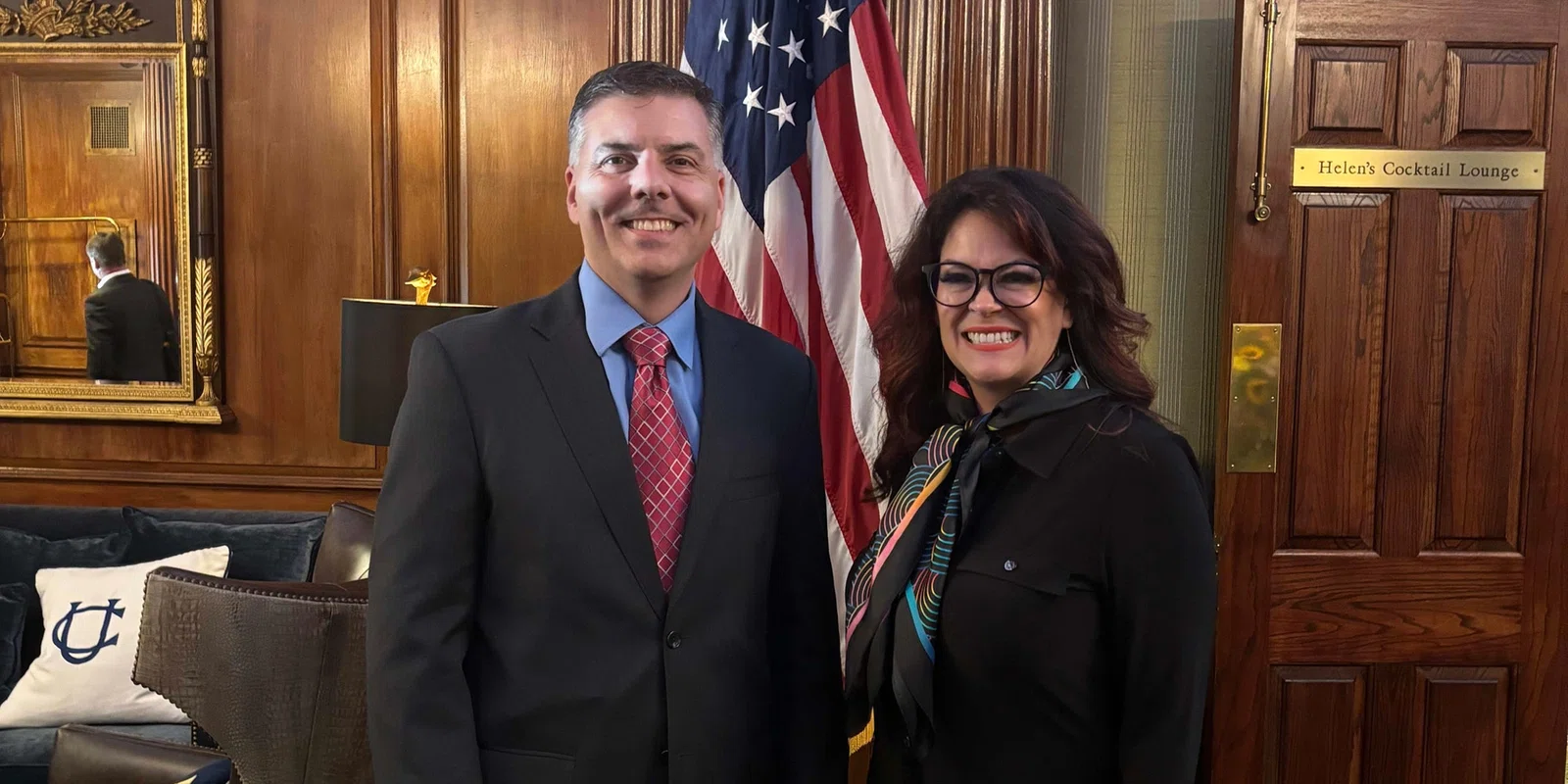



Close
result
INSIGHT
Learning by watching:
a new way to grow a chief of staff
Learning by watching:
a new way to grow a chief of staff
CSA
8 min read

Ali McKenzie and Terry Berland of Unicorn & Lion have trained up a chief of staff for their client by creating a bespoke apprenticeship programme. They spoke to the CSA about how it started, how it’s going, and the lessons that other principals and chiefs of staff could take from it.
Ali McKenzie was finding her way around a new organisation. She and her business partner, Terry Berland, had been managing a large-scale business transformation on a consultancy basis, but had just agreed to take on an interim leadership contract and create an Office of the CEO. Ali needed to dig into the details of the organisational processes and technology. Luckily, her initial conversations with different departments revealed that there were three people who were going to be able to help her – all, coincidentally, called Tony.
‘I went and found the first Tony, and we had this fascinating conversation—he was a wealth of knowledge on a particular topic,’ she said. ‘But then I asked, "Can you help me find the other Tony who can teach me about incident and process management?" And he laughed and said, "Why do you think there's another Tony that works on this? What else is on your list?”.’ It was in that moment that Ali realised that the three Tonys she was looking for were all in the one man right in front of her.
It emerged that on three separate technology topics—none of which were even in the same tech department—he was the expert. Tony is also one of the original co-founders, and that sparked an idea for Ali and Terry: Tony could make an excellent chief of staff. ‘Everything you’d want in a chief of staff was there,’ she said. ‘His wealth of knowledge, his curiosity, his drive to bring people together, his ability to triangulate information, his transparency.’

Ali McKenzie
Co-Founder & Chief of Staff, Unicorn & Lion
Prior to starting Unicorn & Lion, Ali served as the Chief of Staff for Violet Defense Group, helping to build out the company’s executive office, develop its HR functions, and helped the company raise over $20 million in a Series B financing. She was also the Chief Operating Officer of the company’s agricultural lighting division, Violet Gro. Previously, she served in multiple capacities within the Nordstrom technology organisation, bridging the gap between technology and business, including a significant role in site operations for their ecommerce business.
Ali is a member of the Chief of Staff Association and has received Chief of Staff certification from their inaugural program at the University of Oxford’s Said Business School. Additionally, Ali is a graduate of the Executive Leadership Development Program from the University of Washington and has completed certification programs in governance and leadership from both Northwestern and Cornell.
Everything you’d want in a chief of staff was there: his wealth of knowledge, his curiosity, his drive to bring people together, his ability to triangulate information, his transparency

Terry Berland
Co-Founder & Principal, Unicorn & Lion
Terry started his working career with the US Navy as an instructor in their Naval Nuclear Power School. After graduate school, he transitioned into consulting and was an early-elect Partner at McKinsey & Co, with a particular focus on strategy and supply chain within healthcare and finance. He then joined Bear Stearns (one of his McKinsey clients) as a Senior Managing Director in charge of large-scale transformation programs, including their rapid growth in structured derivates. After Bear’s acquisition by JPMorgan, he joined Lehman (and subsequently Barclays) as their Global Head of Purchasing and Supply Chain.
Terry graduated from the University of Notre Dame with a bachelor’s in Mathematics, and he received his MBA from Kellogg’s Graduate School of Business at Northwestern University.
Ali and Terry decided to create an apprenticeship design for Tony so that he could learn the job of chief of staff through observing and working with them. For three months he attended every meeting and watched every interaction, asking questions, learning, and reflecting – but not immediately executing on or implementing anything. ‘We were attached at the hip, helping refine, train, and teach him in real-time,’ said Ali. Ali and Terry’s initial goal was to help him ’swim in the pool,’ as they like to say. What they mean by that is learning to think like, sound like, move like, react like a chief of staff before having to operate like a chief of staff. It also allowed them the opportunity to assess Tony up close on a daily basis. This became important as they were able to quickly identify skill and capability gaps and create plans to address them. Then by the time the right opportunity came around for him to lead his first project in the role, he was up for the task.
The executive committee holds a big offsite meeting in November every year. It is a week-long event with a full agenda, covering everything from department reviews to end-of-year budgeting and finalising bonuses. They also make decisions about what initiatives are going forward or not. Tony’s first project as a chief of staff was orchestrating the event. That included everything from putting together a draft agenda for that week to logistic management, to ensuring the objectives of the week align with the organisation’s overall strategy.
‘After that,’ said Ali, ‘we moved into what we called "passenger-seat/driver-seat" exercises. I would say, "I’m going to drive this meeting or project, and you’ll sit in the passenger seat, ask questions, and participate." Slowly, we began to shift some of the responsibilities. I’d step into the passenger seat, and Tony would take the wheel.’
She admitted that this was not a particularly easy exercise for her, as she was so used to being the one driving the meeting or project. ‘I had to keep reminding myself, "No, this is Tony’s turn." And there were moments when I’d watch Tony approach a problem in a way that wasn’t how I would do it. But I had to be patient and just listen, not to step in or take over. What matters are results, not necessarily the exact process someone follows to get there.’
As a chief of staff, your role is often to manage the executive team—organising and orchestrating their activities. What better way is there to understand the challenges those leaders face than by stepping into their shoes?
Fast forward to now and, following Tony’s participation in the Chief of Staff Association Executive Education Programme in Oxford, Terry has two certified chiefs of staff at his disposal. Having said that, Tony is still gaining new experiences as he and Ali are currently alternating the chief of staff role with Ali’s other identity as ‘chief gap-filler’, stepping into vacant roles as an interim manager when needed – as often happens in start-up to mid-size companies. Today, Tony is serving as the interim Executive Director of Software and Product Development, and is ‘learning what it’s like to take care of a department, manage a budget, and keep regular updates with the CEO,’ said Ali. ‘It’s a little bit of training, too, because as a chief of staff, your role is often to manage the executive team—organising and orchestrating their activities. What better way is there to understand the challenges those leaders face than by stepping into their shoes?’
As there is no defined career path for chiefs of staff, Tony’s specific apprenticeship model is probably an unrepeatable experience as it is unique to his situation. However, the framework is transferrable in multiple circumstances. As Ali said, ‘there’s no one-size-fits-all model because every chief of staff is different. I couldn’t say, "This is exactly how we’d do it for everyone," because we’re identifying where Tony needs to level up and what the needs of the organisation are.’
The framework offers some new perspectives on the chief of staff role and suggests the sort of person who will be successful in it.
Tony already had generalist tendencies. Although his expertise was in the tech area of the business, it was in three tech areas! Furthermore, after a short time together Ali and Terry learned of his nickname, ’The Wolf’, given to him long before they arrived on the scene. It was given to him because he could be brought in to solve almost any problem in the organisation and then go back to his day job. Once Ali and Terry pulled him off the ‘dancefloor’ of tech and introduced him to the ‘balcony’ view of the whole organisation, he was very comfortable there. ‘Watching his eyes light up was incredible,’ said Ali. ‘He’d go, “Wait a minute, that shouldn’t be there. We should go talk to them, tell them to connect with this person.” He was so excited and passionate. He knows everyone in the organisation. He knows the players, where the skeletons are buried, the potholes they’ve hit, and things they’ve tried that didn’t work. He would say, "I know why you think that’s a good idea, but we’ve already tried it, and here’s what went wrong".’
He was well known and well liked. Terry explained: ‘I think the reason Tony works so well in this environment is because people already knew him and trusted him. They honestly wanted more for him and the bigger role that he was coming into as a Chief of Staff in the Office of the CEO was well received. That’s the interesting part. Everyone knew that, under the old model, Tony was kind of stuck in his role and wasn’t able to grow. But once he was liberated, it was like, “Okay, now let’s figure out how to get more out of Tony”.’
He is learning how to navigate the power dynamics. Although Tony knew and got along with members of the executive team, his chief of staff apprenticeship has taught him so much more about figuring out the different personalities and motivations involved. For example, a chief of staff needs to know who is not very transparent, or who struggles with pushing back and gets upset when they hear the word ‘no’. Ali said, ‘Tony is learning to empower these people to lead without authority. It’s all about navigating these different personalities and dynamics. The knowledge that he brings up to the Office of the CEO and his learnings along the way will bring significant value regardless of how the organisational model evolves.’
They also reassured Tony that he would be an active part of the process for defining the long-term strategy and organisational design for the company. He would spend time with potential leadership candidates in person, ask questions, and get a sense of whether they were a good match – not just in terms of personality, but also in their approach to work-life balance and fit with the organisation.
Meanwhile, as the company has transformed by leaps and bounds in the last few years, shareholders, investors, and employees will come in knowing that the business is already in good hands. ‘Tony knows the company, knows the people, and has the trust of the team,’ said Ali. ‘The Office of the CEO can then focus on current revenue, new revenue, and strategic partnerships, as Tony provides significant leverage and expertise with operational execution and implementation.’
Terry concluded: ‘A lot of CEOs struggle with delegation because they’re afraid things will go wrong, or they think others can’t handle it. But when you have a chief of staff like Tony or Ali by your side every day—someone who’s got it, even if it’s not done exactly how you would do it—you can trust them to handle things. A true proxy and partner.’
In conclusion, the apprenticeship model utilised by Ali McKenzie and Terry Berland offers a novel approach to developing exceptional chief of staff talent. By fostering a deep understanding of the organisation, its people, and its strategic goals, this method equips individuals with the necessary skills and mindset to thrive in this demanding role. As Tony's journey demonstrates, a well-structured apprenticeship can unlock the potential of talented individuals, empowering them to become invaluable assets to their organisations.





